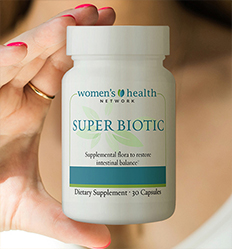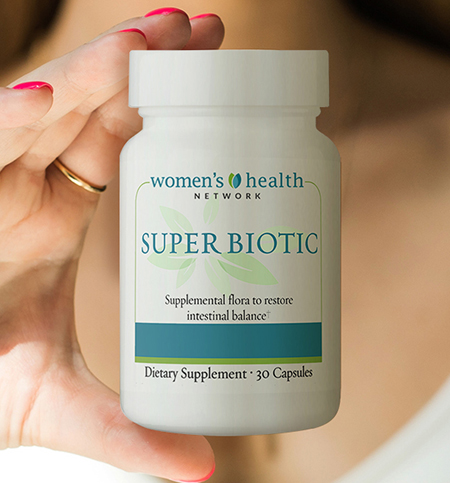The gut microbiome, home to trillions of bacteria nestled among the lining of the GI tract, influences so many facets of our health – from digestion and nutrient absorption to immune function and inflammation response. Bone metabolism and healthy bone tissue formation are also on this list as recent research confirms, yet again, just how important our gut’s beneficial microflora is to bone – and why antibiotics can interfere with these bone-building benefits.

First, the good news. Take a peek at just some of the many ways probiotics – the gut microbiome’s “friendly flora” – support optimal bone health…
Probiotics help the body synthesize and utilize key nutrients for bone
Gut flora assists in the absorption of essential bone-building nutrients including calcium, magnesium and Vitamin D, from the foods we eat (and supplements we take). Probiotics create a healthier gut environment, supporting nutrient uptake into the bloodstream. Probiotics also help to synthesize Vitamin K, the micronutrient involved with the production of proteins in bone, including osteocalcin, which is needed to prevent bone weakening.
Probiotics are part of slowing down bone-damaging inflammation
When inflammation in the body is chronic and unchecked, it can trigger a cascade of harmful side effects, including bone loss. There is a simple explanation why: Messenger molecules called inflammatory cytokines, which tell the body to keep its inflammation response turned on, also stimulate the activity of osteoclasts, the cells responsible for breaking down bone tissue. Excessive osteoclast activity results in bone loss and weakened bones. By helping to restore balance to the inflammatory response, probiotics help to head off “cytokine storms,” re-regulating osteoclast activity and preventing bone loss.
Short-chain fatty acids in the gut give bone-building osteoblasts a boost
Probiotics stimulate the production of short-chain fatty acids (SCFAs) in the gut, mainly through the fermentation of dietary fibers. SCFAs are associated with improved bone density and reduced risk of osteoporosis because they stimulate the activity of osteoblasts, the cells responsible for building new bone tissue (bone formation). SCFAs also assist with calcium absorption.
Protection from declining estrogen levels in menopause
As levels of estrogen decline in perimenopause and menopause, the hormone’s protective health effects diminish with it. In the gut, lowered estrogen levels contribute to gut permeability (aka “leaky gut”), which triggers inflammation and impairs nutrient absorption – putting bone at risk. As a study from the Journal of Clinical Investigation found, using probiotics to reduce gut permeability quieted inflammation and significantly slowed bone loss.
Antibiotics harm bone – and do it quickly
Taking a course of antibiotics may be a necessary step when facing down a bacterial infection, but it can’t be overlooked that antibiotics kill all bacteria, including beneficial probiotics in the gut. When good flora is diminished, it creates a state of dysbiosis, or an imbalance in the composition of gut bacteria, which sets in motion a domino effect … of disrupted nutrient absorption, impaired production of SCFAs, lack of protection against leaky gut and bone loss.
The really shocking thing? In animal studies these bone-damaging effects showed up within four weeks of taking a course of antibiotics.
If you have taken an antibiotic recently, you must be intentional about repopulating your gut with good bugs – and do it fast so you don’t give up any ground in your bid to protect your bones. The four weeks during and after a course of antibiotics is a crucial time for gut flora repopulation to reverse this potential for harm and keep your bone-building and strengthening goals on track.
Fortunately, you can support your gut flora balance through some easy steps:
Add probiotics to your diet
During and after taking an antibiotic consume at least one probiotic-rich food daily to start repopulating beneficial gut flora. Even if you haven’t taken an antibiotic lately, this is still a great idea! Foods that offer beneficial amounts of probiotics include:
- Yogurt
- Buttermilk
- Kefir
- Sauerkraut
- Olives
- Pickled ginger
- Kimchi
- Tempeh
- Miso
- True pickles
- Natto
Eliminate sugar
High sugar consumption can disrupt the balance of gut microbiota, favoring the growth of harmful bacteria and yeast while reducing beneficial bacteria diversity, potentially making a state of dysbiosis even worse. Cut out foods in your diet that pack added sugar. Stick with whole foods that balance fiber with any natural sugars the food may contain.
Take a probiotic with multiple strains that are good for bone
Supplementing with a high-quality probiotic is a helpful way to ensure a steady flow of the “good guys” after a round of antibiotics. However, not all probiotics are created equal! Look for one that contains these five strains that are backed by research for their bone benefits.
L. Acidophilus — enhances calcium absorption and modulates inflammation to improve bone density and reduce bone loss, especially after menopause.
L. Rhamnosus — studied for its ability to modulate the immune system and reduce inflammation, benefitting bone health by preserving bone density.
L. Lactis — a bone-boosting strain that may be particularly helpful for reducing periodontal bone loss.
B. Longum — This strain has shown potential for enhancing calcium absorption.
B. Bifidum — produces short-chain fatty acids (SCFAs) through fermentation of dietary fibers. Some research suggests that B. Bifidum may also influence hormone levels in the body, including estrogen.
Let the good flora flourish
Good gut health is the foundation for all health. Not sure about the state of your microbiome? Take our Digestive Health Quiz to learn more about telltale signs that your beneficial microbiota could use some reinforcements and other helpful steps you can take to nourish your gut — and help the good flora flourish!









